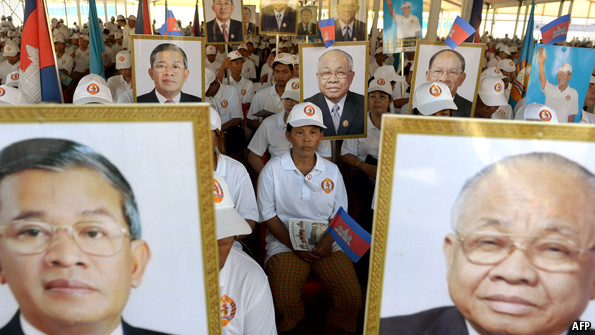
SUPREMELY confident that his Cambodian People’s Party (CPP) will romp
to yet another handsome majority in the general election on July 28th,
Hun Sen, the prime minister, is hardly bothering to campaign himself.
His ministers and minions do it for him, spreading out across the
country to mobilise one of the region’s most formidable grassroots
political organisations.
On the face of it, Mr Hun Sen (pictured, above, on the placard on the
left) has every reason to be relaxed. At only 61 and in power since
1985, he is already Asia’s longest-serving prime minister. His party
enjoys all the advantages that come with monopolising state power for
decades: a captive government bureaucracy, near-total control of the
media and mountains of cash. The CPP has increased its seats in
Parliament in every election since democracy was fully restored in 1998,
winning 90 out of 123 seats at the most recent election. Along the way
Mr Hun Sen has used violence, and now more often the courts, to quash
dissent and scatter any opposition. His reputation as a strongman does
not seem to bother him. Though he provokes criticism from Western
politicians and human-rights groups, China takes pains to flatter him.
This time round, however, the CPP is not having it all its own way. A
whiff of genuine competition is in the air, mainly because the usually
fissiparous opposition has managed to come together as the Cambodian
National Rescue Party (CNRP). It combines the parliamentary strength of
the well-established Sam Rainsy Party (26 seats in Parliament) with the
Human Rights Party (HRP), founded only in 2007. The HRP won just three
seats at the last election, but is strong at the local level.
As important, the CNRP’s leader, Kem Sokha, a veteran activist, is
proving a most effective campaigner. When the government recently tried
to stop local radio stations from rebroadcasting Khmer language foreign
programmes (from the likes of Radio Free Asia), it was a thinly veiled
attempt to take Mr Kem Sokha off the air. These stations are how he
reaches the people in the countryside who make up the majority of
voters. Embarrassingly, the government quickly had to back down after a
deluge of domestic and foreign protests. Mr Kem Sokha has rattled Mr Hun
Sen, who is usually imperturbable.
Indeed, Mr Kem Sokha has the prime minister’s touch of being able to
talk to poor farmers and stallholders about economic matters in ways
that they understand. Unlike Mr Hun Sen, however, he is very visibly on
the campaign trail, visiting a fresh province almost every day. Denied
access to the media, and with low internet penetration in Cambodia, his
is an old-fashioned kind of campaign, involving bellowing his message
through a megaphone from the back of a pickup truck. His supporters love
it. He draws large crowds as he takes the fight to Mr Hun Sen’s home
turf of the countryside, challenging the supposed economic success
there.
Mr Hun Sun’s chief appeal to the country’s 9m or so voters is what
one veteran observer sums up as “stability and roads”. Given Cambodia’s
history, it is a compelling combination. The CPP argues that after the
terrible decades of the 1970s, 1980s and 1990s—of Pol Pot and the
genocidal Khmer Rouge regime followed by a Vietnamese invasion and then
civil war—it was the party that brought peace to the country. And with
that peace has come a palpable prosperity: last year GDP grew by over
7%. It has enabled the government to embark on a big programme to boost
infrastructure, helped by the Chinese. In a poll of Cambodians earlier
this year, America’s International Republican Institute found that 79%
of respondents thought that the country was heading “in the right
direction”, while 74% said that this was because more roads were being
built, allowing farmers to take their rice to market, for example. The
economy would seem to be Mr Hun Sen’s strong suit, therefore.
Hun Sen’s road
Sensibly, the opposition does not dispute the economic growth.
Rather, it argues that the benefits of the boom go to an ever smaller
elite consisting of the families of Mr Hun Sen and his cronies. It taps
into a widely held belief that Cambodia is growing more and more
corrupt, and that Mr Hun Sen’s rule is becoming alarmingly dynastic. All
three of his sons play big roles in the regime, and one, the head of
the CPP’s youth wing, is now running for a seat in Parliament.
To redress the economic imbalance, the CNRP proposes a populist
programme borrowed, in parts, from a former Thai prime minister, Thaksin
Shinawatra (who happens to be a chum of Mr Hun Sen). Mr Kem Sokha
promises an old-age pension of $10 a month and a minimum wage of $150.
The costs of such programmes appear to have been badly thought out, if
at all. Such is the luxury of opposition.
The CNRP says that for the coming election the voter rolls have been
fiddled, and that the government will also find other ways to cheat.
Still, the opposition’s cause will be helped if a long-exiled leader,
Sam Rainsy, returns before polling day, as he has promised. He fled the
country in 2005, facing several charges, all politically motivated, he
claims. If he returns, the police vow to arrest him at the airport. That
would prevent Mr Sam Rainsy from campaigning. But his incarceration
would be even more valuable to the CNRP, as a symbol of Mr Hun Sen’s
intolerant ways.

1 comment:
"His supporters love it. He draws large crowds as he takes the fight to Mr Hun Sen’s home turf of the countryside, challenging the supposed economic success there."but we find so annoying as it is too lourd and full of sh.t.
Post a Comment